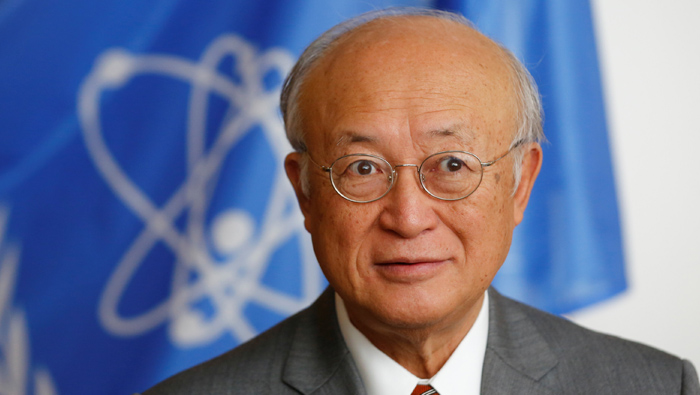
Vienna: The U.N. nuclear watchdog's chief urged major powers on Tuesday to clarify a part of their nuclear deal with Iran dealing with technology that could be used to develop an atom bomb, an area Russia said the agency should leave alone.
The 2015 pact between six major powers and Iran restricts its nuclear activities in exchange for the lifting of sanctions against the Islamic Republic.
Compliance with those curbs is being verified by the International Atomic Energy Agency.
IAEA Director General Yukiya Amano has defended the deal as a major step forward while declining to comment specifically on criticism of it by the administration of U.S. President Donald Trump, who has called the accord - reached by predecessor Barack Obama - "an embarrassment to the United States".
But while Nikki Haley, U.S. Ambassador to the United Nations, has infuriated Tehran by saying the IAEA should widen its inspections to include military sites, diplomats say Russia has been trying to restrict the agency's role by arguing it has no authority to police a broadly worded section of the deal.
That section bans "activities which could contribute to the development of a nuclear explosive device".
It lists examples such as using computer models that simulate a nuclear bomb, or designing multi-point, explosive detonation systems.
Unlike many other parts of the deal, the provision, known as Section T, makes no mention of the IAEA or specifics of how it will be verified.
Russia says that means the IAEA has no authority over it.
Western powers and the agency disagree.
"Our tools are limited," Amano told Reuters when asked if his agency had the means to verify Section T.
"In other sections, for example, Iran has committed to submit declarations, place their activities under safeguards or ensure access by us. But in Section T I don't see any (such commitment)."
Amano said he hoped the parties to the agreement would discuss the issue in the Joint Commission, a forum created by the deal, adding that even a clearer definition of terms such as the technology referred to would be an improvement.
"More clarification would be helpful ... Russia has a different view. They believe that it is not the mandate of the IAEA. Others have different views and discussions are ongoing."
Trump has hinted that he may not recertify the agreement when it comes up for review by a mid-October deadline, in which case the U.S. Congress would have 60 days to decide whether to reimpose sanctions waived under the accord, known officially as the Joint Comprehensive Plan of Action (JCPOA).
Amano repeated, however, that Iran was implementing its nuclear commitments under the deal.
He said complementary access - often consisting of short-notice inspections carried out under the IAEA Additional Protocol, which Iran is implementing under the accord - was going smoothly.
"Complementary access in Iran is being undertaken without problem and the number of accesses is quite high," he said.
When asked if a successful Iran deal could help encourage a political solution in nuclear-armed North Korea, to which the IAEA has no access, Amano said the two situations were quite different.
But he added: "I also do not say that there's no comparison, because in the JCPOA's case, diplomacy worked."